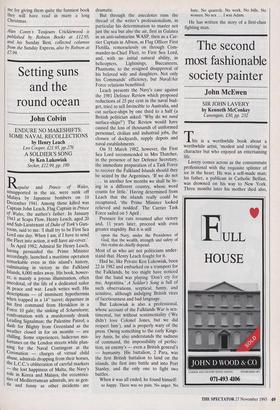Setting suns and the round ocean
John Colvin
Repulse and Prince of Wales, unsupported in the air, were sunk off Malaya by Japanese bombers on 10 December 1941. Among those killed was Captain John Leach, Flag Captain in Prince of Wales, the author's father. In January 1943 at Scapa Flow, Henry Leach, aged 20 and Sub-Lieutenant of Duke of York's Gun- room, said to me: 'I shall try to be First Sea Lord one day. When I am, if I have to send the Fleet into action, it will have air-cover.'
In April 1982, Admiral Sir Henry Leach, having persuaded the Prime Minister accordingly, launched a maritime operation remarkable even in this island's history, culminating in victory in the Falkland Islands, 8,000 miles away. His book, howev- er, is mainly a joyous illumination, often anecdotal, of the life of a dedicated sailor In peace and war. Leach writes well. His descriptions — of imminent hypothermia when trapped in a 14" turret; departure in his first command from Heraklion in a Force 10 gale; the sinking of Scharnhorst; confrontation with a murderously drunk Leading Signalman; the Palestine Patrol; a dash for Blighty from Greenland as the weather closed in for six months — are chilling. Some experiences, ludicrous mis- fortunes on the London streets while plan- ning for the Naval Contingent at the Coronation — charges of virtual child abuse, admirals dropping from their horses, the L.C.C.'s obliteration of careful markers — the lost happiness of Malta, the Navy's role in Korea and Malaya, the eccentrici- ties of Mediterranean admirals, are as gen- tle and funny as other incidents are
dramatic.
But through the anecdotes runs the thread of the writer's professionalism, in particular his determination to master not just the sea but also the air, first in Galatea in an anti-submarine WASP, then as a Car- rier Captain in Albion, as Flag Officer First Flotilla, remorselessly on through Com- mander-in-Chief Fleet, to First Sea Lord, and, with no initial natural ability, in helicopters, Lightnings, Buccaneers, Phantoms, to the resigned disapproval of his beloved wife and daughters. Not only his Commands' efficiency, but Naval/Air Force relations benefitted.
Leach presents the Navy's case against the 1981 Defence Review which proposed reductions of 25 per cent in the naval bud- get, tried to sell Invincible to Australia, and cut surface-ships by one third to a half (a British politician asked: 'Why do we need surface-ships?') The Review would have caused the loss of thousands of uniformed personnel, civilian and industrial jobs, the closure of dockyards, supply depots and naval establishments
On 31 March 1982, however, the First Sea Lord recommended to Mrs Thatcher, in the presence of her Defence Secretary, the immediate preparation of a Task Force to recover the Falkland Islands should they be seized by the Argentines. 'If we do not . . . in another few months we shall be liv- ing in a different country, whose word counts for little.' Having determined from Leach that the islands really could be recaptured, 'the Prime Minister looked relieved and nodded'. The Carrier Task Force sailed on 5 April .
Pressure for cuts resumed after victory and, 11 years later, proceed with even greater stupidity. But it is still
upon the Navy, under the Providence of God, that the wealth, strength and safety of this realm do chiefly depend.
Most of us who are not politicians under- stand that. Henry Leach fought for it.
Had he, like Private Ken Lukowiak, been 22 in 1982 and embarked on a transport for the Falklands, he too might have noticed that the band was playing 'Don't cry for me, Argentina.' A Soldier's Song is full of such observations, sceptical, funny, and sensitive, although indulging BritiSh vices of facetiousness and bad language.
But Lukowiak is also a professional, whose account of the Falklands War is sen- timental, but without sentimentality ('We didn't love Colonel Jones, but we did respect him'), and is properly wary of the press. Owing something to the early Kings- ley Anus, he also understands the sadness of command, the impossibility of perfec- tion, an enemy's — even a British general's — humanity. His battalion, 2 Para, was the first British battalion to land on the islands, the first into battle and into Port Stanley, and the only one to fight two battles.
When it was all ended, he found himself: so happy. There was no pain. No anger. No
hate. No quarrels. No work. No bills. No women. No sex . I was Adam.
He has written the story of a first-class fighting man.










































































 Previous page
Previous page